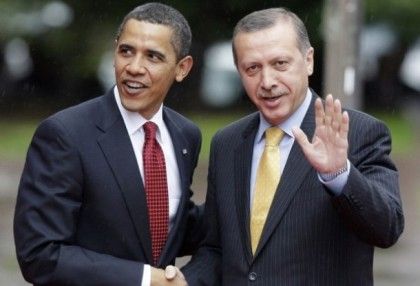Although the U.S. President Barack Obama gave a variety of messages to make everybody happy during his two-and-a-half day state visit, opinion makers and politicians keep talking about what really was the concrete outcome of his presence in Turkey.
Obama paid ample homage to Kemal Ataturk and his secularism in his address to the Turkish National Assembly which definitely made those who oppose the Islamic-oriented policies of the Tayyip Erdogan government happy. The general feeling in these circles was that Obama’s White House will stop encouraging Turkey to become a “moderate Islamic state” as the previous Bush administration did.
The next day, when he met with about 100 youngsters in Istanbul, he did not miss to make a point for the pious Turks by saying that he wants to end the meeting before the muezzin calls for evening prayers from the minaret.
He made Erdogan happy by hugging him Turkish style and saying, “I was impressed by the prime minister’s leadership when I first met him at the G-20 meeting in London.”
He made opposition party leaders happy by seeing them, albeit for only 10 minutes each, separately, including the Ahmet Turk, the leader of the pro-Kurdish Democratic Society Party (DTP) with whom Prime Minister Erdogan even refuses to shake hands with.
He made minorities happy by meeting the religious leaders, non-Muslim and Muslim in Istanbul. He made Orthodox Patriarch Bartholomeos happy by receiving him separately, indicating that he recognizes the ecumenical status of the pontiff as the spiritual head of 170 million Christians belonging to Orthodoxy. To make the patriarch even happier he asked publicly from the Turkish government to reopen the Chalki seminary.
Realizing that his advice to Turkey to solve its problems with Armenia caused certain annoyance in Azerbaijan, he even called Ilham Aliev, the Azeri president to soothe him and to tell him that his administration is ready to help solve the issue of Nagorno-Karabagh, a territory belonging to Azerbaijan but occupied by Armenia.
What are the pluses and minuses of the Obama visit
Now that Obama has left, newspapers, television screens, magazines and coffee houses are brimming with discussions, debates and arguments over the pluses and minuses of the presidential visit.
“We have watched a visit completely built on symbolism,” writes Ibrahim Karagul, a columnist of pro-government, Islamic-oriented Yeni Safak daily in one of the most accurate assessments of the Obama visit.
“As entire Turkey we were carried away with a wind of sympathy as if we should forget the marks of the past within two days, as if we should forget the tragic events of the recent past during which hundreds of thousands people were killed on our doorstep. The U.S. President Barack Obama’s visit to Turkey, his meetings, the speeches he delivered, his body language, his mimicry, the places he visited and his messages were very carefully planned and meticulously executed. He played his role well, because he was sincere. He was sincere, because he came to power against the odds of the America we know. He would change the world in spite of the odds of America we know,” wrote Karagul.
Despite all this euphoria and nice-sounding messages, the commentator expresses his doubts about to what extent these messages are feasible in a world which is living through a period of dire economic crisis and political difficulties related to it. Whether all these well wishing could be accomplished in a region where rivalries turn into bloody battles and competition for natural resources turn into cut-throat fights, Karagul asks.
Those irritated by comments on Armenia, Kurds
Although President Obama carefully avoided mentioning the word “genocide” his advice to the Turkish parliament “to reckon with the past” drew strong reaction from Devlet Bahceli, the leader of the rightwing Nationalist Action Party (MHP). Bahceli described Obama’s comments as “impolite.”
Speaking at a television discussion program Deniz Bolukbasi, a MHP deputy and a retired ambassador pointed out to Obama’s reference to the Kurdish population of Turkey as a “minority.” “It is the first time that the Kurds are mentioned as an ethnic minority in Turkey by a U.S. President,” he said.
Turkey’s former Washington ambassador Faruk Logoglu who also took part in the same program commented that Obama’s mention of “ethnic minority” indicates how the U.S. administration is approaching the question. “I don’t see any problem with cooperation against the PKK (Kurdish separatist Workers Party of Kurdistan) terror but when it comes to solving problems inside Turkey, I believe that this term has been used unmindfully. This approach might bring in front of us a discomforting picture at Turkish-American talks to find a solution to this problem,” said Logoglu.
Turkey officially does not accept the Kurds as “minority” because the Lausanne Treaty of 1923 listed only non-Moslem communities to be protected under its terms.
It seems that the concrete and practical results, if any, of the Obama visit is hard to discern. After the U.S. President left Turkey to fly unannounced to Baghdad, an exhausted Tayyip Erdogan appeared before the press in Istanbul and said normalization of relations withArmenia will not happen before this country solves its disputes with the neighboring Azerbaijan. He accused the opposition politicians of slander against his government for arguing that Turkey might sell out Azerbaijan in exchange for Obama’s blocking of the Armenian genocide bill at the U.S. Congress.
“There is no work underway right now about that,” he said replying to a question on Obama’s request for opening of the Chalki seminary.
Regarding what may have been the demands of the U.S. President at behind the doors talks concerning sending Turkish combat troops to Afghanistan, Turkey’s relations with Iran, Israel and other Middle Eastern nations or withdrawal of U.S. troops from Iraq through Turkish territory, officials in Ankara prefer to keep mum.
But on the whole, Turkey believes that Obama opened up a new page in Turkish-American relations that were not faring well under the Bush administration.

